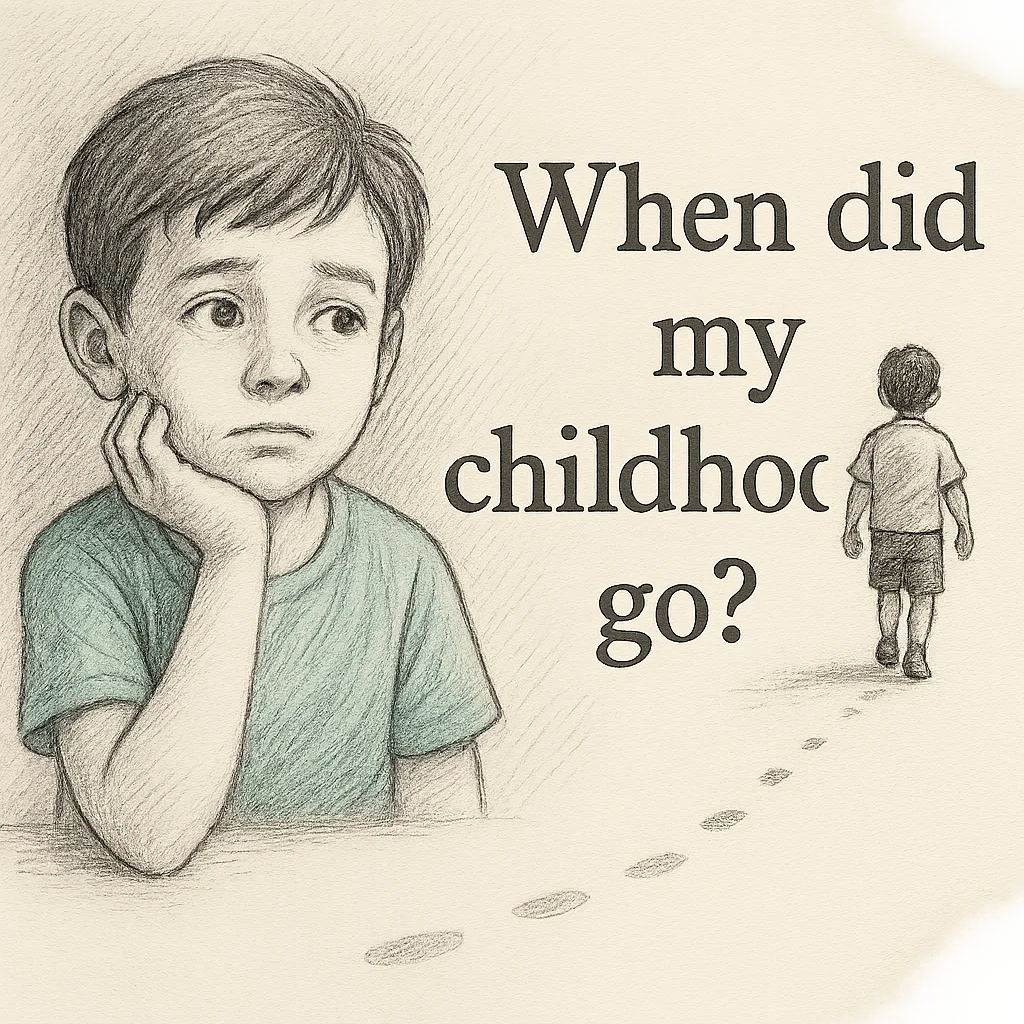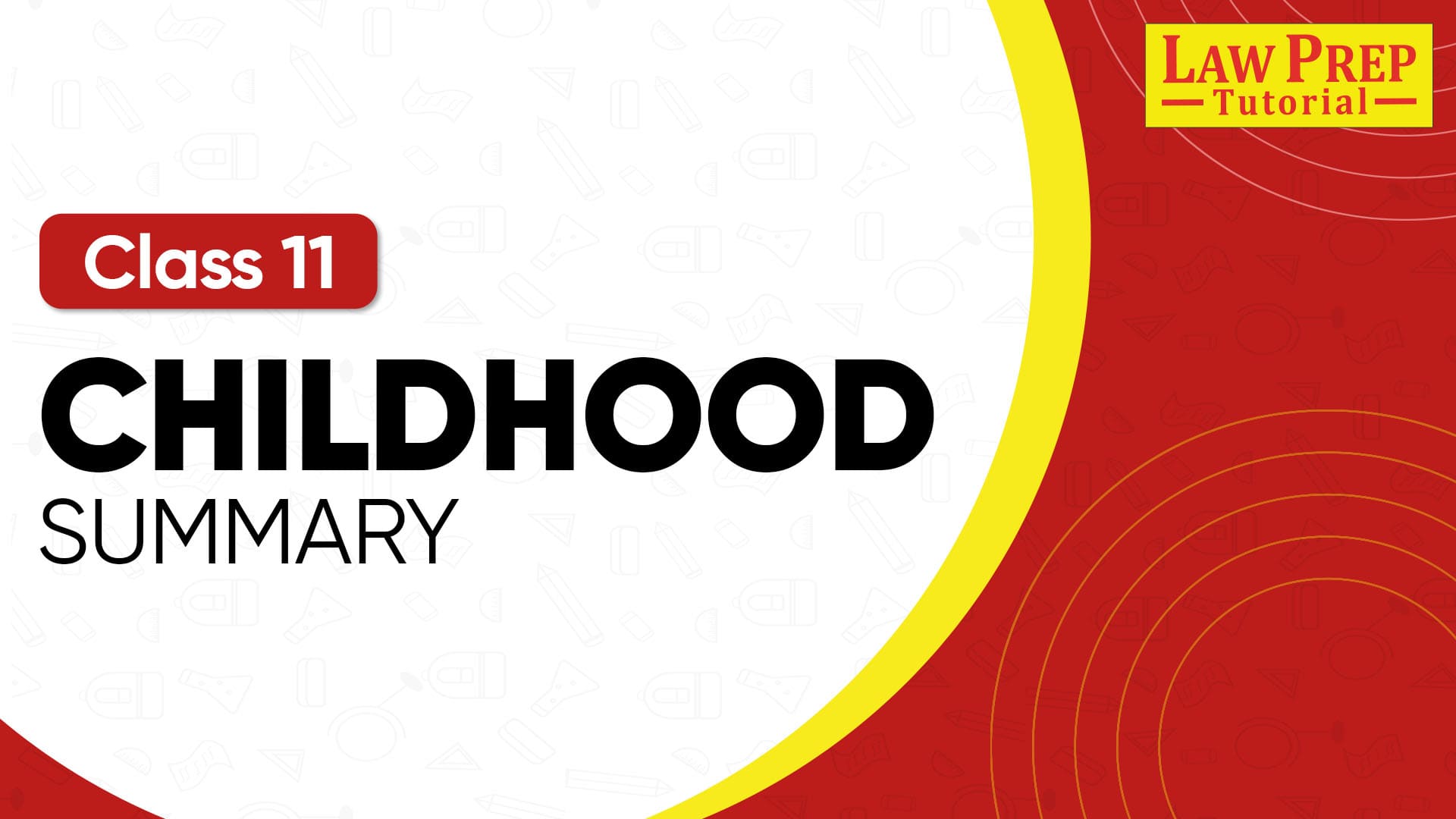When you study English in Class 11, Childhood by Markus Natten is one of the most thought-provoking poems. It makes us reflect on the moment when innocence fades and maturity begins.
Below, we bring you the Childhood class 11th summary explained in simple words, along with the central idea. The summary of Childhood poem highlights the poet’s search for the point at which childhood is lost—whether it is when we discover hypocrisy, gain rational thinking, or grow into adulthood.
This explanation will help you prepare well for exams and understand the deeper meaning of the poem.
Are you a law aspirant? Book free counselling with India’s best online CLAT coaching.

Summary of Childhood: Class 11 Poem
The poem Childhood by Markus Natten is a reflective piece that explores the poet’s thoughts about the loss of childhood and the transition into adulthood. It is written in a tone of curiosity and self-questioning, where the poet seeks to identify the moment when innocence ends and maturity begins.
The poet wonders when exactly his childhood disappeared. He questions if it was the time when he realized that adults are not always as perfect as they appear. As a child, he believed adults to be truthful and trustworthy, but as he grew, he recognized that they sometimes preach values but do not follow them in their own lives. This discovery of hypocrisy shakes his childhood faith and marks a step into maturity.
He further reflects whether his childhood ended when he began to understand that the concept of heaven and hell is only a belief, not a physical reality. As a child, he trusted what he was told, but with growing rational thinking, he learned that such ideas may not exist. This questioning of traditional beliefs reflects the shift from innocence to reasoning.
The poet also considers whether childhood ended when he realized the individuality of human beings. Each person has their own mind, way of thinking, and choices. Understanding the uniqueness of individuals and developing one’s own identity is another sign of leaving childhood behind.
Despite all these realizations, the poet concludes that childhood is not entirely lost. Instead, it remains hidden in the face of an innocent child. Every time he looks at a child’s expression, he sees the purity, simplicity, and truth that symbolize childhood.
In essence, the poem is a journey of self-reflection. It portrays childhood as a phase of innocence, faith, and dependence, while adulthood brings questioning, reasoning, and independence. Markus Natten does not give one exact answer to when childhood ends, but he shows that it gradually fades as we grow in awareness and maturity.
Through this, the poem becomes universal—it speaks to every reader’s experience of growing up and realizing that life is not as simple as it once seemed.
More Important Resources for CBSE Exam:
| Class 11th Hornbill Syllabus | CBSE Class 11th Commerce Subjects |
| CBSE Full Form | All about CBSE Class 11th |
| Class 11th Syllabus | Class 12th Syllabus |
| Class 11th Commerce Books | CBSE Board: All details |
Short Summary of Childhood Poem
The poem Childhood by Markus Natten reflects on the loss of innocence and the moment when one steps into maturity. The poet questions when his childhood truly ended. He wonders if it was when he discovered that adults are often hypocritical—they say one thing but do another.
He also asks if it ended when he realized that heaven and hell are not physical places but only concepts. Another possibility he considers is when he understood that every person has a mind of their own and an independent way of thinking. These realizations mark the shift from simplicity to rationality and self-awareness.
In the end, the poet concludes that though his own childhood has disappeared, it can still be seen in the pure and innocent expressions of young children. The poem captures the universal transition from innocence to experience.
Childhood Poem Explanation (Stanza-wise)
Below is the stanza-wise summary of Childhood poem in class 11th English:
Stanza 1
When did my childhood go?
Was it the day I ceased to be eleven,
Was it the time I realized that Hell and Heaven,
Could not be found in Geography,
And therefore could not be,
Was that the day!
Explanation:
In this stanza, the poet reflects on the loss of his childhood. He wonders if it ended when he turned twelve or when he began to think rationally. He realized that heaven and hell, which he had believed in as a child, are not actual places that can be found on a map. This logical reasoning made him question childhood beliefs, marking a step toward maturity.
Stanza 2
When did my childhood go?
Was it the time I realized that adults were not
all they seemed to be,
They talked of love and preached of love,
But did not act so lovingly,
Was that the day!
Explanation:
Here, the poet considers another possibility. He thinks his childhood might have ended when he discovered the hypocrisy of adults. As a child, he believed adults were always truthful and genuine. But with maturity, he realized that adults often speak about values like love and honesty, yet fail to practice them. This awareness made him lose faith in the innocence of childhood.
Stanza 3
When did my childhood go?
Was it when I found my mind was really mine,
To use whichever way I choose,
Producing thoughts that were not those of other people
But my own, and mine alone
Was that the day!
Explanation:
In this stanza, the poet reflects on individuality. He believes childhood might have ended when he realized that his mind was independent. He could think freely, make choices, and form ideas of his own, different from others. This discovery of personal identity and self-awareness is another marker of growing up.
Stanza 4
Where did my childhood go?
It went to some forgotten place,
That’s hidden in an infant’s face,
That’s all I know.
Explanation:
In the final stanza, the poet concludes that his childhood is not truly gone but hidden. It now exists in the innocent smiles and pure expressions of little children. For him, childhood is a symbol of simplicity, honesty, and innocence that can be seen in young kids, even though he has outgrown it.
Poetic Devices in Childhood Class 11
| Poetic Device | Example from the Poem | Explanation |
| Rhetorical Question | “When did my childhood go?” | Repeated questioning emphasizes the poet’s search for the moment childhood ended. |
| Repetition | “Was that the day!” | Highlights the poet’s doubt and self-reflection. |
| Imagery | “Hidden in an infant’s face” | Creates a visual image of innocence in a child’s expression. |
| Alliteration | “Was it the time I realized” | Repetition of consonant sound ‘w’ for rhythm. |
| Symbolism | Childhood | Represents innocence, purity, and simplicity. |
| Contrast | Adults talking of love but not acting lovingly | Shows difference between words and actions. |
| Enjambment | Lines flow without punctuation, e.g., “Producing thoughts that were not those of other people / But my own” | Reflects the poet’s stream of thought. |
Word Meanings in Childhood Class 11th
| Word | Meaning |
| Ceased | Stopped |
| Geography | Used here to mean physical location on earth |
| Preached | To advise or speak about moral values |
| Lovingly | With love, kindness, or affection |
| Infant | A very young child, a baby |
| Forgotten place | Something lost or not remembered clearly |
| Producing thoughts | Creating independent ideas |
| Seemed | Appeared to be |
| Realized | Understood clearly |
| Mine alone | Belonging only to me, not shared with others |
Read the chapter-wise summaries of Class 11 English here:
About the Poet of Childhood: Markus Natten
Markus Natten is a contemporary poet from Norway, known for his reflective and thought-provoking poetry. His works often deal with themes of self-discovery, innocence, and the transition from childhood to adulthood.
In the poem Childhood, included in the Class 11 NCERT English textbook Hornbill, Natten explores the moment when innocence is lost and maturity begins. His simple yet powerful style engages readers by asking universal questions about life, growth, and identity.
Though little biographical information about him is widely available, Childhood has become one of his most recognized works, appreciated by students for its clarity and depth.
Central Idea of Childhood Class 11th
The central idea of the poem Childhood in class 11th is that childhood does not disappear suddenly but gradually gives way to maturity as one gains experience, independence, and critical thinking. Yet, the poet concludes that the essence of childhood still exists in the innocent faces of little children.
Theme of Childhood Poem
- Loss of Innocence: The transition from a phase of purity and simplicity to awareness and questioning.
- Hypocrisy of Adults: Discovery that adults often say one thing but do another.
- Rational Thinking: Realization that beliefs like heaven and hell are not physical realities.
- Individuality and Self-Awareness: Recognition that one’s mind is independent and capable of unique thoughts.
- Search for Childhood: The poet’s attempt to find where childhood went, concluding it survives in the innocent faces of children.
Find detailed questions and answers from all chapters of English Class 11 now:
FAQs About Childhood Class 11th Poem
Childhood is written by Markus Natten, a Norwegian poet known for reflective and introspective writing.
Adulthood is described as a stage where one realizes the hypocrisy of adults, questions traditional beliefs, and becomes aware of independent thought and individuality.
The poet means that childhood, with all its innocence and purity, still exists in the simple, uncorrupted expressions of little children.
Rationality replaces blind faith and innocence. When the poet understood that heaven and hell cannot be located in geography, he realized that such beliefs were illusions—marking a step toward maturity.
The repeated question emphasizes the poet’s confusion and search for the exact moment when innocence was lost and self-awareness began.
The poet observes that adults preach values like love but do not practice them, revealing their double standards.
It helps students reflect on their own transition from innocence to maturity, while also preparing them with a clear understanding of the poem’s central idea, theme, and literary devices.
Check the latest CBSE Class 11 syllabus for all subjects below:
Explore the updated CBSE Class 12 syllabus for all subjects here:
Discover CLAT exam resources that can help you get started early:
Explore CLAT coaching centers across different cities:


